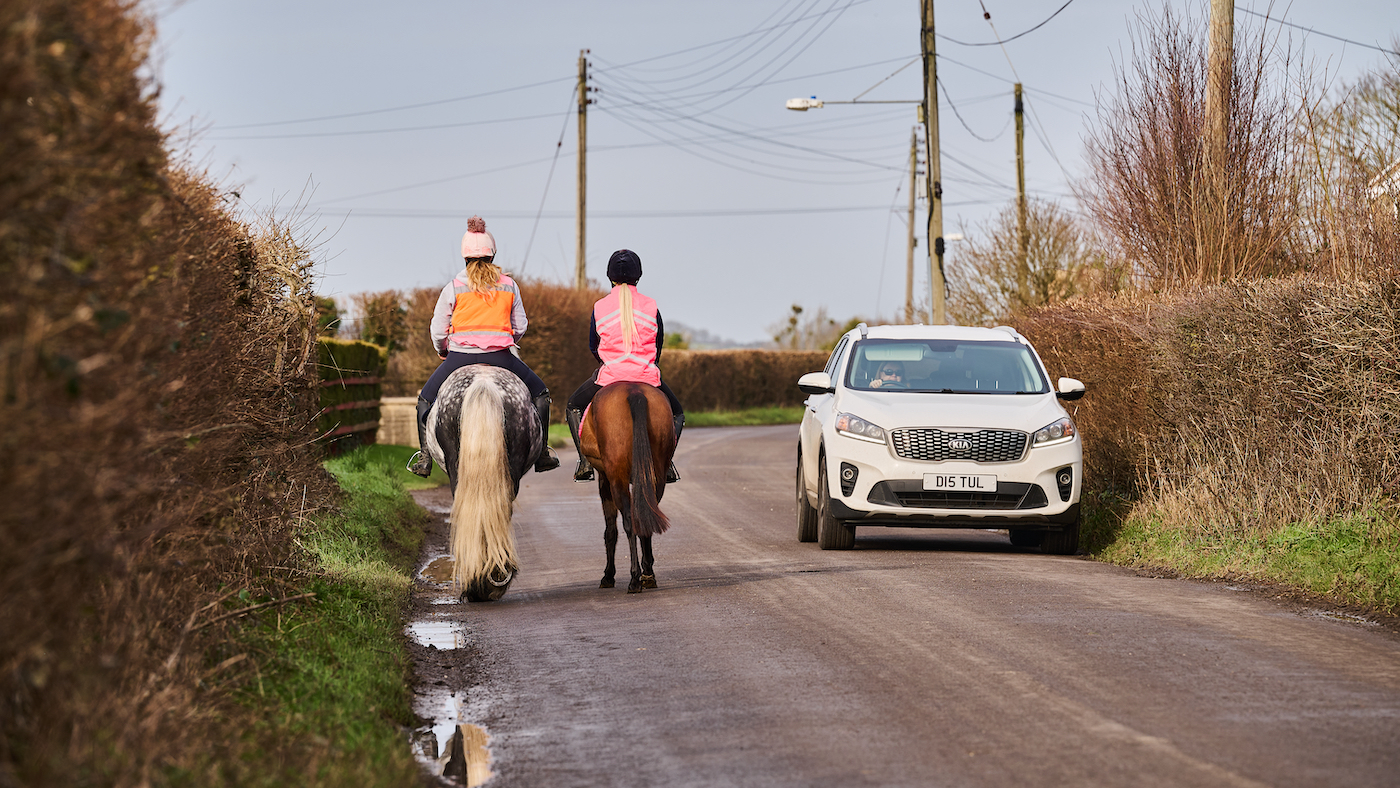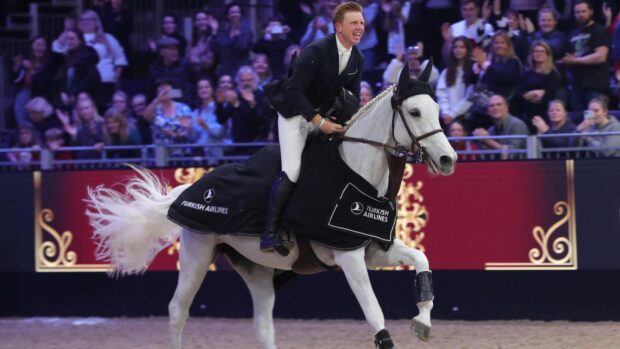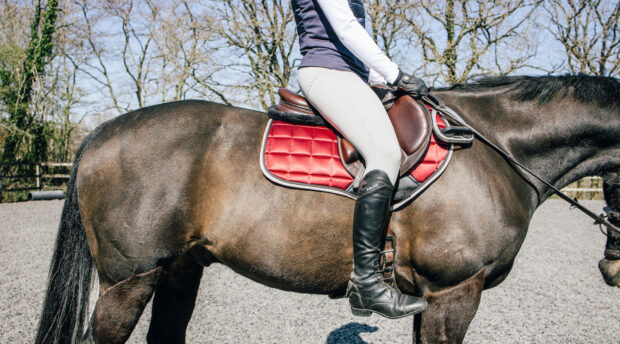You may be happy soaring over five-foot hedges or riding into a dressage arena packed with spectators, but the idea of hacking on the roads sets you quaking in your boots. Building confidence for riding a horse on the road is a tricky area.
Traffic has increased massively over the years, and not all drivers know how to pass horses appropriately. Although the British Horse Society (BHS) has made huge efforts with their road safety campaigns, it remains a major concern.
However, for many of us, riding on the roads is essential if only to get to safe hacking routes. If we have a mental block about it, our nerves can transfer to our horse and exacerbate the tension.

A tense rider will transfer their nerves to the horse. Credit: Andrew Sydenham
Let’s take a look at how to alleviate some of the worries, so that you can enjoy every step of the ride.
5 key steps to improve confidence for horse riding on the road
1. Set yourself up for safety
The BHS has several tips that we can follow to help us stay safe when on the roads with our horses.
These include:
- Wear high-vis and reflective equipment, both on yourself and on your horse, so that you are easy to see from all angles. LED lights should also be considered
- Learn the Highway Code rules to ensure you behave correctly and interact appropriately with other road users
- Be alert at all times – so put that phone away, and don’t hack on the roads while wearing headphones
- Take a road safety test such as the BHS Ride Safe Award or Pony Club Riding and Road Safety
- Use hand signals to show when you are intending to make a manoeuvre
- Take a charged phone with you, and tell people back at the yard where you are going
- Report any incidents or dangerous driving

A rider and horse in high-vis equipment. The BHS suggests a minimum of a high-vis tabard for the rider, and leg bands for the horse. Credit: Lucy Merrell
2. Pick something to focus on
Equestrian mental performance coach Poppy Blandford says when riders worry about what might happen on the road, it often means they have become fixated on an outcome.
“If you’re going out and thinking, ‘I just want to survive this’, you’re going to cause anxiety in your body, your body’s going to feel out of control and you’re going to be tense,” she says.
“You want to switch from thinking about the ‘what if’ to thinking about what you want to achieve while hacking out.”

Company, for both horse and rider, can be helpful for building confidence and giving you a different focus. Credit: Andrew Sydenham
“Choose something to focus on like being able to soften your hands and let your horse stretch, keeping your body straight, or just giving your horse something to do so that you have a job. By focusing on something we’re taking ourselves away from that outcome that creates the stress, and engaging in things that we know that we can do.
“It sounds kind of obvious, but it’s not obvious at all when you’re in those moments of worry and doubt. Doing this will allow you to take control of the experience, rather than having an ‘I just need to get through this’ mentality.”
3. Get a pen and paper
Poppy recommends writing your worries down to help boost your confidence horse riding on the road.

Put your concerns and action plans down on paper. Credit: Emma Herrod Photography
“If the ‘what ifs’ and worries are flying around your head then write them down. It might be, ‘What if my horse spooks at something on the road?’,” she says.
“Put it on paper, and then write what you will do in that moment. How would you slow them down or reconnect with them?
“By writing down what you will do you are coming up with solutions, and when you start to program your brain into solutions, we’re moving away from the anxiety by saying, ‘No matter what happens, I have a solution’.
“By making a plan for it, you’re taking control of your behaviour and you’re moving away from being reactive in these situations to being proactive.”
4. Find your anchor
Ahead for Life’s Debbie Hill says when riders have worries about the road what they are doing is risk assessing – and she reminds us that this is normal and OK.
“We risk assess for a reason – because riding on the road can be dangerous, but once we’ve risk assessed we can accept that those risks are there, and carry on. Often it’s the perception and catastrophising that causes the lack of confidence,” explains Debbie.

Passing cars is an inevitable “hazard” while hacking on the road. Credit: Philip Barker
“We’re thinking about things that could go wrong, and when we do this we kick off the fight, flight or freeze mechanisms; we become tense, our breathing becomes shorter, and then our horses tune into this.
“When you’re in this moment, it’s helpful to envision a place where you feel calm and or think of a song that you can immerse yourself into that takes you to a happy place where you feel safe. We call these anchors, so it’s anchoring you into a frame of mind and way of being, and taking yourself out of that place of worry.”
5. Box breathing
Consultant clinical psychologist with Changing Minds Dr Duncan Law, who has worked with top sports athletes, recommends using breathing techniques during moments of anxiousness.
Box breathing involves inhaling through your nose for a count of four, holding your breath for four, exhaling through your mouth for four, then holding your breath for four – and repeating.

Don’t forget to breathe! Conscious breathing exercises can be really helpful in managing stress. Credit: Emma Herrod Photography
“If you’ve had situations where you’ve had poor outcomes, you might have a tendency to dwell on those unhelpful thoughts and think things like, ‘Here we go again’ or ‘I can’t do this anymore’. These can be understandable thoughts, but in order to perform a task, you need to push these out of your head,” he says.
“Box breathing helps people first of all to remember to breathe, which might sound crazy, but when we get really anxious and adrenaline starts to flow we forget to breathe or we almost pant, where we really shallow breathe.
“All sorts of biochemical processes go on and you can feel light headed, can’t concentrate, and you’re less well prepared. Box breathing helps you to remember to breathe and to breathe properly, and by doing this it calms down the bit of your nervous system that helps regulate us.”

Focus on the end result: a canter in an open field may be the reward after the roadwork. Credit: Emma Herrod Photography
We cannot remove all elements of risk associated with riding on the roads, but we can improve our mental and physical approach to help ourselves and our horses behave in a calm and relaxed manner. This not only makes the ride more enjoyable, but reduces certain aspects of the risk due to your control of the situation.
You may also be interested in:

*Exclusive* Build your confidence in handling horses on the ground, whether you’re a rider or the vital helping hand

*Exclusive* Boost your confidence in the saddle with these 6 steps to channel focus and shake off the nerves

Lost riding confidence after having a baby? A confidence coach explains why becoming a parent can affect your equestrian life

Scared after falling off a horse? A confidence coach explains why this might happen

Struggling with nerves? Boost your confidence and enjoy riding again with these helpful tips





